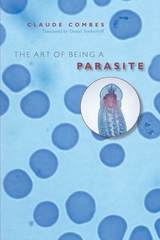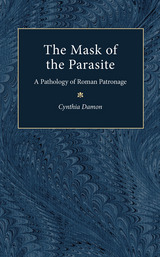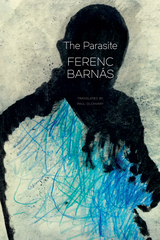3 books about Parasite

The Art of Being a Parasite
Claude Combes
University of Chicago Press, 2005
Parasites are a masterful work of evolutionary art. The tiny mite Histiostoma laboratorium, a parasite of Drosophila, launches itself, in an incredible display of evolutionary engineering, like a surface-to-air missile at a fruit fly far above its head. Gravid mussels such as Lampsilis ventricosa undulate excitedly as they release their parasitic larval offspring, conning greedy predators in search of a tasty meal into hosting the parasite.
The Art of Being a Parasite is an extensive collection of these and other wonderful and weird stories that illuminate the ecology and evolution of interactions between species. Claude Combes illustrates what it means to be a parasite by considering every stage of its interactions, from invading to reproducing and leaving the host. An accessible and engaging follow-up to Combes's Parasitism, this book will be of interest to both scholars and nonspecialists in the fields of biodiversity, natural history, ecology, public health, and evolution.
The Art of Being a Parasite is an extensive collection of these and other wonderful and weird stories that illuminate the ecology and evolution of interactions between species. Claude Combes illustrates what it means to be a parasite by considering every stage of its interactions, from invading to reproducing and leaving the host. An accessible and engaging follow-up to Combes's Parasitism, this book will be of interest to both scholars and nonspecialists in the fields of biodiversity, natural history, ecology, public health, and evolution.
[more]

The Mask of the Parasite
A Pathology of Roman Patronage
Cynthia Damon
University of Michigan Press, 1997
When Romans applied the term "parasite" to contemporaries in dependent circumstances, or clientes, they were evoking one of the stock characters of ancient Greek comedy. In the Roman world the parasite was moved out of his native genre into the literatures of invective and social criticism, where his Greek origins made him a uniquely useful transmitter of Roman perceptions. Whenever the figure of the parasite is used to mask a person in Roman society, we know that an effort of interpretation is underway. The fit between the mask and its wearer is in the eyes of the beholder, and in Rome the mask seemed to fit people in many different situations: entrepreneurs, tax-farmers, lawyers, female companions, philosophers, and poets.
In The Mask of the Parasite, Cynthia Damon maintains that the parasite of Latin literature is a negative reflection of the cliens. In Part One she assembles a composite picture of the comic parasite using as evidence fragments of Greek comedy, works from Greek writers of the imperial period whose works reflect the comic tradition, and the ten complete plays of Roman comedy in which a parasite appears. In parts two and three she examines the ways in which Cicero and the satirists use the figure of the parasite: Cicero in belittling his opponents in court, Horace and Martial in creating a negative foil for the poeta cliens, Juvenal in painting contemporary patron/client relationships as morally and spiritually bankrupt.
The Mask of the Parasite is a fascinating study of the intersection of literature and society in ancient Rome. However, neither the parasite nor patronage is confined to the Roman world. Students of classical studies as well as students of literature and cultural studies will find this to be a work of utmost importance in understanding these complex issues of human interaction.
Cynthia Damon is Assistant Professor of Classics, Amherst College
In The Mask of the Parasite, Cynthia Damon maintains that the parasite of Latin literature is a negative reflection of the cliens. In Part One she assembles a composite picture of the comic parasite using as evidence fragments of Greek comedy, works from Greek writers of the imperial period whose works reflect the comic tradition, and the ten complete plays of Roman comedy in which a parasite appears. In parts two and three she examines the ways in which Cicero and the satirists use the figure of the parasite: Cicero in belittling his opponents in court, Horace and Martial in creating a negative foil for the poeta cliens, Juvenal in painting contemporary patron/client relationships as morally and spiritually bankrupt.
The Mask of the Parasite is a fascinating study of the intersection of literature and society in ancient Rome. However, neither the parasite nor patronage is confined to the Roman world. Students of classical studies as well as students of literature and cultural studies will find this to be a work of utmost importance in understanding these complex issues of human interaction.
Cynthia Damon is Assistant Professor of Classics, Amherst College
[more]

The Parasite
Ferenc Barnás
Seagull Books, 2020
Marked by powerful and evocative prose, Ferenc Barnás’s novel tells the fascinating story of a young man’s journey through his strange obsessions towards possible recovery. The unnamed narrator is the parasite, feeding off others’ ailments, but he is also a host who attracts people with the most peculiar manias. He confesses, almost amiably, his decadent attraction as a young adolescent to illnesses and hospitals. The real descent into his private, hallucinatory hell begins after his first sexual encounter; he becomes a compulsive masturbator, and then a compulsive fornicator. But to his horror, he realizes that casual sex is not casual at all for him—each one-night stand results in insane jealousy: he imagines previous lovers hovering over him every time he makes love to a woman.
When he gets to know a woman referred to as L., he thinks his demons may have finally subsided. But when he hears of her past, the jealousy returns. He seeks relief through writing—by weaving an imagined tale of L.’s amorous adventures. What will he do with this strange manuscript, and can it bring him healing?
A breathtaking blend of Dostoevskian visions, episodes of madness, and intellectual fervor, all delivered in precise, lucid prose, The Parasite is a novel that one cannot escape.
When he gets to know a woman referred to as L., he thinks his demons may have finally subsided. But when he hears of her past, the jealousy returns. He seeks relief through writing—by weaving an imagined tale of L.’s amorous adventures. What will he do with this strange manuscript, and can it bring him healing?
A breathtaking blend of Dostoevskian visions, episodes of madness, and intellectual fervor, all delivered in precise, lucid prose, The Parasite is a novel that one cannot escape.
[more]
READERS
Browse our collection.
PUBLISHERS
See BiblioVault's publisher services.
STUDENT SERVICES
Files for college accessibility offices.
UChicago Accessibility Resources
home | accessibility | search | about | contact us
BiblioVault ® 2001 - 2024
The University of Chicago Press









